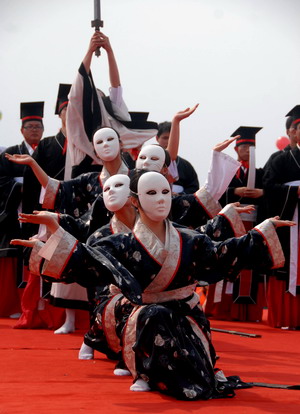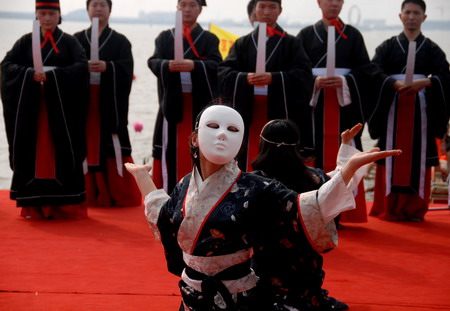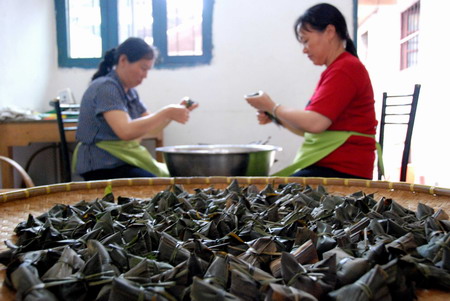Society
- Details
- By David Cao
- Hits: 778

Caution: This report may contains unconfortable Photos and Videos, Just make sure your still wanna continue reading!!!
Twenty-five people were burned alive and 76 injured when a bus caught fire in Chengdu, capital of Sichuan province, around 8 am on Friday.
The bus on route No 9 was passing over Chuanshan Viaduct on its way from Tianhui township to downtown Chengdu when the fire broke out, Mao Zhixiong, Chengdu city government spokesman, said.
More than 10 passengers reportedly escaped through the front door or windows, which locals could break until the blaze threatened to engulf them. The rest were trapped inside the bus because the rear door failed to open and the mad scampering made it difficult for people to flee, witnesses said.
Witnesses informed the fire brigade as soon as they saw the blaze, and firefighters rushed toward the spot but were stuck in a traffic jam just 1 km from the spot.
By the time they reached the scene at 8:11 am, dozens of passengers had already been burned to death in the overcrowded bus, Mao said.
{youku}id_XOTY0ODMyMzI={/youku}
According to rules, the bus should have been carrying four hammers for use in an emergency - to break windows and door panes to let people out if the automatic mechanism to open and close doors malfunctions.
But an inspection team, headed by Sichuan deputy governor Li Chengyun found the bus, which had run 270,000 km, had five steel windows but no hammers.
Overcrowded buses have become a common sight in Chengdu, a city of more than 10 million people. At least 110 people were packed into the bus on route No 9, which had a capacity for just 75 passengers.
Xinhua quoted a vendor near the spot as having said the bus driver was not among the victims, and instead took part in the rescue work.
The injured were rushed to four hospitals, with 45 being admitted to the Chengdu Army General Hospital.
"All of them have suffered serious burns, so even though the weather is pretty hot, we dare not switch on the air conditioners," Zheng Lihong, the hospital's head nurse, said. "No air conditioning, no fans."
Many of the passengers who escaped the fire are unaccounted for, hospital staff said, as local officials urged residents to offer "all possible information" to help identify them.
A joint probe team, set up by the provincial and city governments, is trying to find the cause of the fire, Chengdu's deputy police chief He Jiansheng said.
Wang Jun, a restaurant owner, said he and a couple of other persons "used stones to break the bus windows". It was through these windows and the front door that the survivors escaped, said a woman surnamed Wu, whose husband was among the injured.
Chengdu civil affairs bureau has set up a 24-hour hotline to provide up-to-date information on the victims.
{youku}id_cp00XOTYzODcyMTY={/youku}
- Details
- By Chinadaily.com.cn
- Hits: 873
 She is at least three times older than many of her competitors.
She is at least three times older than many of her competitors.
She was not even sure what she was competing for when she first stepped onto the stage.
But once she opened her mouth, judges and audiences were blown away.
Meet 79-year-old Wu Baiwei, the oldest contender yet for China's "Happy Girl".
"I was on the street and saw many girls signing up for some kind of singing contest. I asked them if an old woman like me could take part and they said 'yes'," Wu said.
It was only later that Wu, a retired teacher in Xi'an, capital of Shaanxi province, found out she had entered a TV singing contest organized by Hunan TV station.
It was heartening to know that the organizers allowed a senior like herself to take part in such a contest aimed at young girls, Wu said.
Still, Wu said she did get some special treatment because of her age - she was whisked past the long lines onto the stage, the moment she arrived at the first few rounds of the competition on Monday.
Impressed by Wu's can-do spirit and singing prowess, all three judges that day reportedly agreed to send Wu to the next round.
Picked from 600 initial competitors, Wu is now one of the top 50 contenders for the final contest slated for July.
She is also being compared with 48-year-old Scottish singing sensation Susan Boyle, who went from obscurity to stardom in the British TV talent show Britain's Got Talent.
"I was so moved by this old woman who was courageous and confident enough to take part I hope old people are living as happily as she is," said Wu Zhoutong, one of the judges.
Indeed, Wu, who taught Chinese at Xi'an Normal University and still gave lectures in two universities after her retirement in 1987, believes happiness is all about "working hard when one is working, and enjoying life when one is retired".
"It's about eating when you want to eat, singing when you want to sing, and playing when you want to play," Wu said to the judges.
Wu said she has had her fair share of sad experiences, especially after losing her husband and daughter.
"But I think people should live with a smile. Sometimes when I have to face difficulties, I encourage myself by singing songs," she said.
"We are very moved by participants such as Wu," said Cao Chunli, director of the contest's Xi'an area.
"In our view, now matter how old a woman is, she is a girl," Cao said.
"We do not know if Wu can advance in the competition and we should consider her health as the later rounds will get more intense," the director said.
"It does not matter whether I can go to the next round or not, I have experienced the happiness of singing on stage," Wu said.
- Details
- By Chinadaily.com.cn
- Hits: 1608
Instead of toiling in an office cubicle as she did two years ago, Ma Yanyan is spending Thursday's Dragon Boat Festival as befits tradition: rowing in sync to a thundering drum beat with 20 teammates across a lake.
The government's decision to elevate three traditional festivals to national holidays gives Chinese, especially city dwellers, a chance to return to their roots and marks an evolution in the country's leisure time.

Days off were once considered a frivolity -- the two-day weekend was introduced fewer than 15 years ago -- but have increasingly been added to the national calendar as the government embraced free-market reforms and tried to boost domestic spending.
Keen on bolstering traditional culture, authorities revised the program again early last year, trimming one weeklong holiday and allocating the extra days for three, shorter customary holidays.

"Time off from work gives me time to celebrate these holidays properly, with traditional activities like dragon boat racing," said Ma, a 32-year-old public relations manager for an environmental activist group. To prepare for this year's festival, Ma practiced several times a week with the Beijing Friendship Dragon Boat team. The team did not miss a beat Thursday at the International Dragon Boat Competition in southern Hunan province, Ma said, even while competing in a thunderstorm.
The holiday commemorates the poet and government minister Qu Yuan, who drowned himself to protest corruption in the royal court 2,000 years ago; the dragon boats are meant to scare off evil spirits from consuming his body.
The shorter holidays -- which also mark the mid-autumn and tomb-sweeping festivals -- mean many Chinese are staying closer to home, and some observers say it has also spurred interest in Chinese culture.
"Even though Chinese have always celebrated traditional holidays, it has become more and more meaningful due to the new law," according to Liu Kuili, director of the China Folklore Association and a professor at the Chinese Academy of Social Sciences, a top think tank. "Rather than just blowing money on a shopping spree, they have time to make an effort to light lanterns at a community street fair or learn to make traditional foods such as dumplings."

The number of Chinese who visited cemeteries to honor ancestors during April's tomb-sweeping festival soared to 100 million last year, nearly double the number in 2007. The figure climbed to 120 million this year, Liu said quoting the Ministry of Civil Affairs statistics.
The government also hopes the renewed attention on traditional Chinese events will diminish the enthusiasm of younger Chinese in embracing Western holidays such as Christmas and Valentine's Day, said Liu.
But the new, shorter holidays have also drawn complaints from travel agencies and local governments that are looking to tourism to reduce the impact of the slack economy. They used to depend on the three weeklong holidays around the Lunar New Year in the winter, National Day in October and May Day, instituted nearly a decade ago.
Worried about the slump, the southern province of Guangdong announced plans to reinstate the weeklong May Day holiday, but the central government revoked the decision.
"There's no time to take a long vacation these days, and our business is down at least 60 percent from last year this time due to the new shorter holidays," said Wei Bo, an agent at Zhouli Sports Travel Agency in Beijing.
Wei is the founder of the Beijing Fiat Car Club, which used to organize weeklong cross-country road trips for groups of more than 100 drivers, but no longer, he said, since few have the time.

Li Feiyun, a 35-year-old executive with an international trading company in Shanghai, said her mother-in-law taught her to make zongzi, the traditional glutinous rice dumpling wrapped in bamboo leaves and eaten during the Dragon Boat Festival. But Li said she is the only one in her immediately family who knows how.
"With many young people working longer hours now, there's a desire to create more meaningful memories with our time off," said Li, who works for an international trading company in Shanghai.

Women prepare zongzi, upon the coming Dragon Boat Festival in Yantian village of Wuyuan County, east China's Jiangxi province Sunday May 24, 2009.
- Details
- By Chinadaily.com.cn
- Hits: 1154
A 14-year-old boy was so frightened to get a call from a number that belonged to a deceased neighbor that he began sharpening his martial arts moves at home to protect himself.
Alone at home last Wednesday night in Nanjing, Jiangsu province, the boy saw the caller ID on his parent's phone and went berserk. The neighbor died two weeks earlier.
He turned up the television volume as loud as it could go, switched on all the lights and called his parents using another phone.
After his parents rushed back home, they saw him doing kungfu. He learned that the dead man gave the phone to his housemaid who was calling to say goodbye before she returned to her hometown.
- Details
- By David Cao
- Hits: 1076
May 12 is the first anniversary of the most devastating Sichuan earthquake in China over 30 years, which has claimed more than 80,000 lives and displaced millions of others, leaving many more hearts broken in Sichuan province.
The people of Chengdu gathering on May 12 in Chengdu city in memory of the death during Sichuan earthquake.
More Articles …
Page 215 of 255
